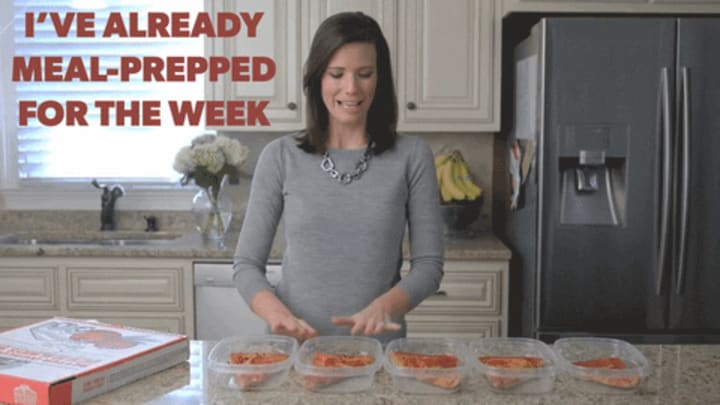5 Key Reasons You Should Start a Weekly Meal Planning and Prep Routine
With a slightly embarrassing confession

Recently I was listening to an episode of Erin Holt’s “Funk’Tional Nutrition Podcast” in which she discusses being introduced by a friend as a Nutritionist who “really walks the talk.” What her friend meant by this was that Erin truly practices and embodies what she preaches in her profession.
This had me reflecting on myself as a Holistic Nutritionist, and in what areas of my lifestyle, and by extension my business, I was perhaps not walking my talk. I had to be really honest with myself and admit that proper, consistent meal planning and meal prepping was an area in which I had been falling short.
I’ve understood and educated others on the benefits of meal planning for some time. It’s even a service I offer! But on a personal note, life has been a little chaotic lately, leading to an inconsistent routine and, naturally, all the convenient excuses not to meal plan. Whoops.

This reflection exercise served as the perfect motivator to get back into planning my meals and grocery shops, and to prep food for the week ahead based on my schedule.
The irony is that, like many people, I fell into the trap of believing that I didn’t have the time or energy to maintain this habit, however getting back into it I quickly remembered how it saves me time, money, and stress.
Read on to learn more about how a consistent meal planning and prep routine can benefit you and your family:
1. It saves time.
I recommend aiming for the same day each week to plan your meals, grocery shop, and prep meals and/or ingredients. Depending on your schedule this may need to be broken down into two days. I personally prefer Sunday. You can also do this twice per week if you want all of the ingredients to be super fresh. You can even plan in two-week increments and pick up ingredients as needed or schedule grocery delivery! Experiment to figure out the routine that works best for you.
It may sound like a lot, but once you get into the habit of doing this each week your process will become more effortless and efficient. If you’re prepping meals and snacks for more than one or two people, see if a family member can share the responsibility.
Tackling the planning, shopping and prepping once per week frees up time throughout the rest of the week since you won’t have to think twice about what’s on the menu, make extra trips to the store, or spend precious hours prepping ingredients.
Tip: Have a weekly meal swap with a friend, family member or neighbour. Prep large batches of a designated number of recipes and swap half with each other. This way you have greater variety without the added effort.
2. It saves money.
When you plan your meals in advance, grocery shops are planned based on the specific quantities needed. This results in less over-buying of ingredients, and most importantly, a much smaller likelihood of resorting to eating out.

According to Statistics Canada, the average Canadian household spent nearly $3,000 on food purchased from restaurants in 2019. While supporting local restaurants is super important, so are our personal finances and health. Restaurant dishes tend to be served up in much larger portions than we would serve ourselves at home, with more sauces, and added salt, sugar and fat. Eating out is an easy fall-back during a busy day—sometimes for multiple meals in a day—and it quickly adds up.
Tip: Buying in-season produce, frozen produce and bulk items (such as tomato sauce, dried beans and grains) is a great way to save additional cash, while keeping the kitchen stocked with the foundations of a good meal.
“Recent research estimates that 20% (or 11 million tonnes) of all the food produced in Canada annually becomes avoidable food loss or waste.” (“Taking stock: Reducing food loss and waste in Canada,” canada.ca, 2019)
3. It helps reduce food waste.
Similar to the point above, when meals are planned out, ingredients can more easily be bought in the specific quantities needed, reducing the amount of food that goes bad and gets tossed.
Food waste is a huge and avoidable problem in Canada. According to this article at canada.ca, “Recent research estimates that 20% (or 11 million tonnes) of all the food produced in Canada annually becomes avoidable food loss or waste — food that could have been eaten, but was instead landfilled, incinerated or managed as organic waste (VCMI, 2019).”
I don’t know about you, but when I grocery shop without a plan for the week, I pick up what looks good simply based on what I’m craving at the time, what looks good and fresh, what may be on sale, and what I think I’ll want to eat. The result is often a mishmash of ingredients, and having over-bought some ingredients while forgetting others. This leads to extra trips to the grocery store, and a much greater likelihood that some of the food I bought won’t get used up in time.
Tip: On the theme of waste, get in the habit of shopping with reusable produce and grocery bags. Keep them near the door or in your car so you’re more likely to remember. Most grocery stores charge for bags, so it will also save you some pocket change!
4. It helps lower stress and decision fatigue.
If your meals are already planned and ready to go, there’s no asking “what should I eat?” and no being asked “what’s for dinner?” without being able to provide an answer.
In the context of what may already be a taxing and hectic day, figuring out what to have for dinner can be an extremely frustrating and stress-inducing exercise, especially if you’re feeding more than just yourself.
There are some uncited instances online stating that the average adult makes some 35,000 decision per day. While there may not be a solid source to back up this massive number, it would not surprise me if it were true. Upon waking we face the decision to look at, or not look at, our notifications. Then shower or coffee? What to wear? Sweet or savoury? This route or that route? And it goes on and on. By the time dinner rolls around it’s no wonder we have no energy to cook, let alone decide what to cook.
Pre-planning the week’s meals, even if only your most stress-worthy meal of the day, helps avoid overwhelm and frustration. When you get home at the end of a long day, you already know what you’re having for dinner and hopefully have some of the ingredients prepped ahead of time. The only other decision to make: What kind of wine would I like with my dinner?

Tip: Plan recipes in portions that will provide a day or two of leftovers so that you’re not cooking something new every day.
5. It encourages nutritious and balanced eating.
By taking the time to plan what you want to eat throughout the week, you’re more likely to ensure that you include a balance of protein, carbs, and fat based on what you’re craving, what’s in budget, and what’s seasonally and locally available.
Food portions are more accurately planned, so overeating is also less likely. For example, if you know you want a recipe to feed four people over the course of two days, it’s easy to scale the recipe and divide it into the right amounts. If anyone is still hungry, they can have a snack!
As mentioned above, meal planning results in less eating out, therefore more control over meals and what goes into them. This is especially helpful for tending to picky eaters, health conditions, and food sensitivities or allergies.
Tip: Use Pinterest or the Mealime app for recipe inspiration!
Feeling lost and overwhelmed when it comes to meal planning?
I offer completely custom meal plans for individuals and families to help get you started. We’ll take into account your preferences, time constraints, budget, and dietary needs. Learn more here.
About the Creator
Erin R. Wilson
Reiki practitioner, learning intuitive medium, modern day witch & nutritionist | Also a designer & illustrator: erinracheldesigns.com






Comments
There are no comments for this story
Be the first to respond and start the conversation.